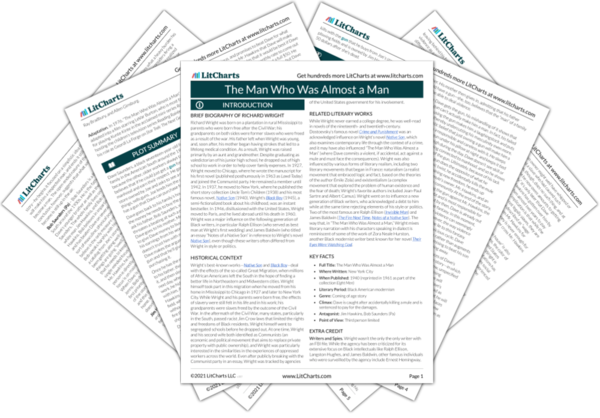The gun’s symbolism in “The Man Who Was Almost a Man” operates on two levels. The first level is what the gun symbolizes to Dave. For Dave, who has grown up to equate the respect that a man gets with the physical violence that the man is capable of, the gun represents manhood. Having a gun, Dave believes, will give him a level of power and control that he doesn’t often get to experience among his older co-workers and domineering, and sometimes physically abusive, father.
Yet at the level of the story, the gun has a more complicated symbolic meaning. Over the course of the story, the gun comes to symbolize the danger and self-destructiveness of so simplistically equating manhood with a capacity for violence. From the moment Dave gets the gun, it seems as if things are about to go disastrously, and then they do go disastrously. First, after getting the gun, he is careless in how he handles it—sleeping with the loaded weapon under his pillow, and then strapping the weapon to his thigh. The story in these moments gives off a sense of foreboding, making clear that the excitement that Dave feels for his capacity to cause violence has made him reckless and unheeding of the responsibility that comes with such power. Then, when he actually fires the gun for the first time, he is so nervous and inexperienced that he closes his eyes and accidentally shoots and kills Jenny the mule. Dave had thought owning a gun would immediately make him a man. That he couldn’t even fire the gun correctly gives the lie to that idea. Jenny’s death then ends up with Dave even more oppressed, and more of a laughingstock then he was before: he’s forced into debt to Mr. Hawkins, the owner of the mule, mocked by everyone who hears the story, and likely to get beaten by his father. The way that Dave’s purchase of the gun so profoundly backfires makes it clear that Dave’s idea that a capacity for violence is the core of becoming a man is not just false, but leads to terrible consequences. That Dave ends the story by running away with the gun—but a gun that now lacks any bullets—makes clear that he ends the story still in the sway of his destructive and simplistic conception of what makes a man, but also that he still has the chance for those ideas to change and mature.
The Gun Quotes in The Man Who Was Almost a Man
Shucks, a man oughta hava little gun aftah he done worked hard all day.
“But Ma, we needa gun. Pa ain got no gun. We needa gun in the house. Yuh kin never tell whut might happen.”
In the gray light of dawn he held it loosely, feeling a sense of power. Could kill a man with a gun like this. Kill anybody, black or white.
The gun felt loose in his fingers; he waved it wildly for a moment. Then he shut his eyes and tightened his forefinger. Bloom! A report half deafened him and he thought his right hand was torn from his arm.
Then he saw the hole in Jenny’s side, right between the ribs. It was round, wet, red. A crimson stream streaked down the front leg, flowing fast. Good Gawd! Ah wuzn’t shootin at the mule.
When he reached the top of a ridge he stood straight and proud in the moonlight, looking at Jim Hawkins’ big white house, feeling the gun sagging in his pocket. Lawd, ef Ah had just one mo bullet Ah’d taka shot at that house. Ah’d like t scare ol man Hawkins jusa little . . . Jusa enough t let im know Dave Saunders is a man.
He felt his pocket; the gun was still there. Ahead the long rails were glinting in the moonlight, stretching away, away to somewhere, somewhere where he could be a man . . .












